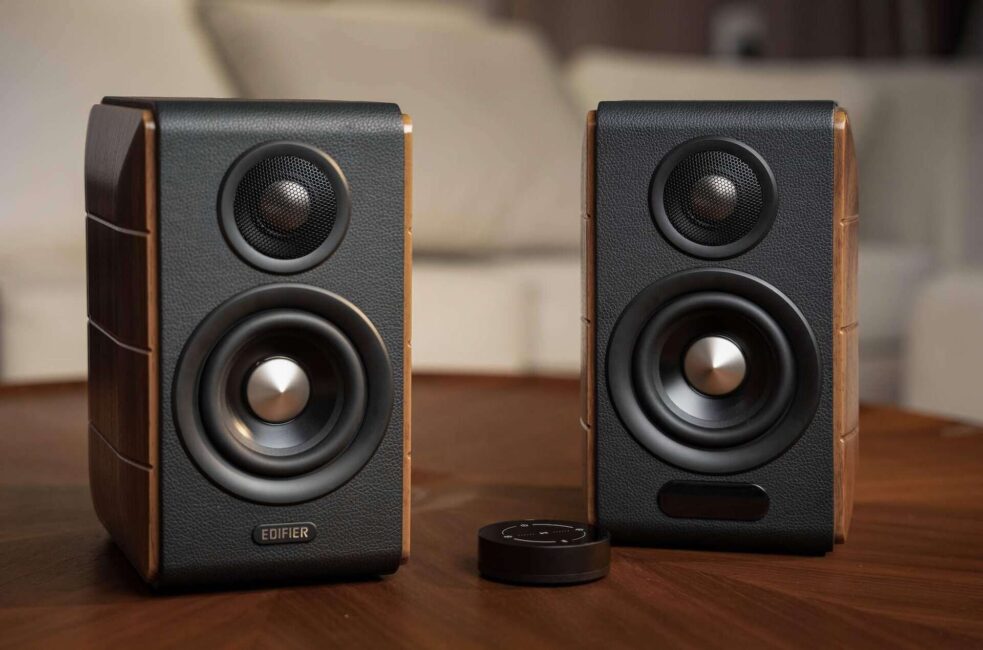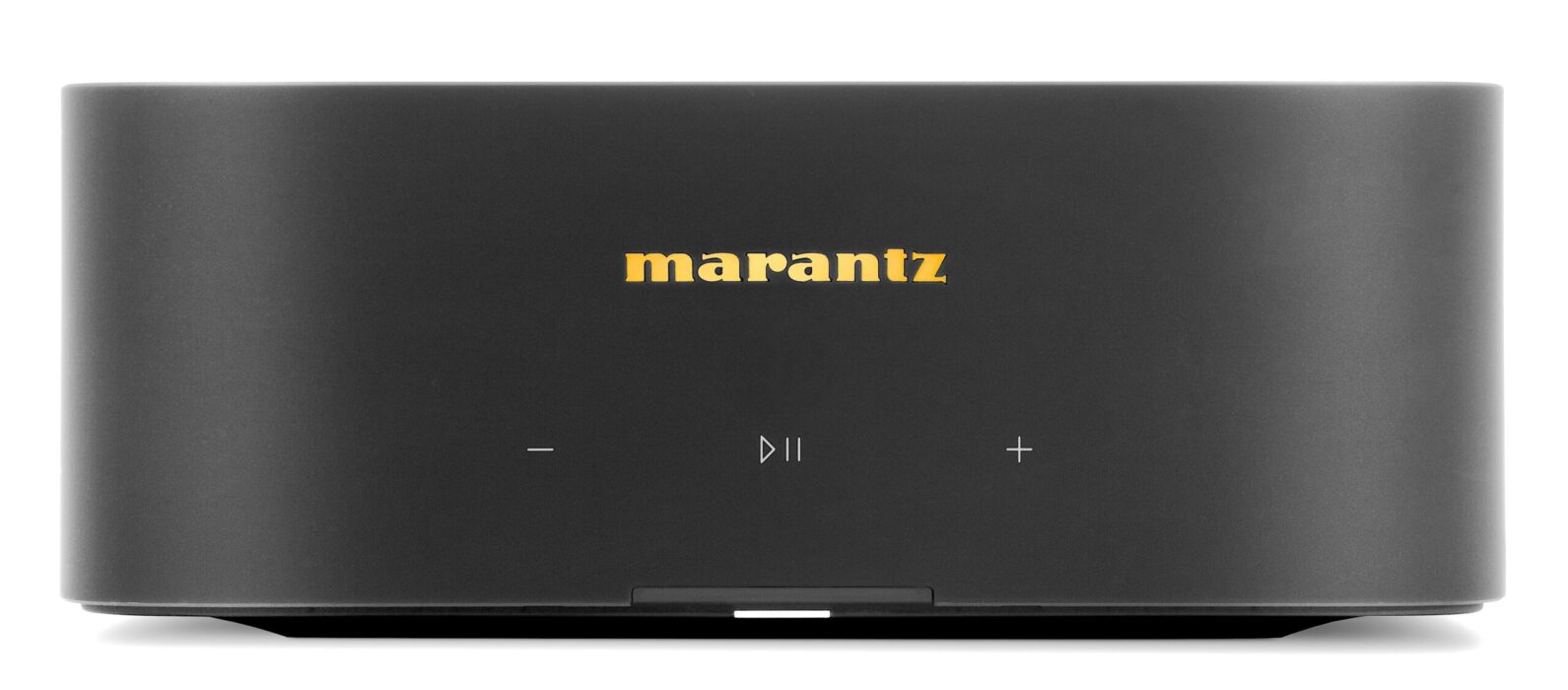The Article
Hydra II Anniversary from Leema
19th March 2019

A big, solid, heavy power amplifier from Leema, Paul Rigby is pinned to the wall by the bulk of Leema’s Hydra II Anniversary Edition
If you roam around social media, especially the specialist hi-fi groups on Facebook, you often get a broad, underlying feeling of loss that emanates from the core of the members. Especially the more mature chaps.
A sort of yearning, I suppose.
Of a time gone. When hi-fi was a glorious thing. A time of wonder. When a man was allowed to be a man without those irritating things that would later be imposed upon him by the strictures of society: sensitivity, tenderness, compassion. All those things that just got…in…the…way.
Back then, he could sit and listen to his music while facing a sheer, impenetrable wall of brushed aluminium topped, if he was lucky, with the Mickey Mouse ears of a reel-to-reel player. The Japanese name plates glinting in the reflected sun.
Back then, he could roar down the high street with no seat belts to restrain him, ready for action in his revving Ford Capri, La Cucaracha shaking the windows of the neighbourhood when the horn was depressed, a bottle of Brut 33 in the glove compartment, the window that would only wind half way down and a hope that his platforms wouldn’t slip off the brake pedal when the need arose.
Back then, he could walk down the High St, a John Travolta bounce propelling him forward, flairs flapping in the breeze, towards a brand new cassette deck. This was a time when the most important feature of the same wasn’t its sound quality. Oh no, that irritation was yet to come. The most important aspect of a new tape deck was the ‘action’ of the cassette door after pressing Eject.
More than that, more than all of that, there was a feeling, when hi-fi was purchased, that you were buying value. Real value. Heavy. Strong. Beefy. Man-size value.
The Leema Hydra power amplifier brings all of the above back. It serves as a time portal back to those heady times. I can just imagine a Hydra resting upon a favourite hi-fi rack and tears, real man kinda tears – none of that new age rubbish – forming in the eyes. A look forming over their exuberant faces. A look that says, “Yes. Hi-fi has finally come home.”
And this particularly Hydra II is celebratory indeed because it is the Anniversary Edition. Ten years ago, the original amplifier rested on its first workbench, then fell through that to the floor, then through that to the basement. It’s 18kg, stuffed into a not too large 440 x 320 x 110mm chassis can be deceiving so, for those yet to enjoy the delights of a hernia? Watch out.
This bridgeable design, pushing out 148W into 8 Ohms, is also dual mono which means that noise was a target for Leema and hurrah for that. Which is why you’ll find two “massive” (and they are) toroidal power transformers inside.
Including LIPS (Leema’s proprietary communication system) that allows for integration with other Leema Acoustics products, there’s a host of additional details in this amplifier: Nichicon MUSE Series capacitors, PCB-to-speaker-terminal wiring is Leema’s Reference 2 cable featuring 16 woven cores plus multi-strand high-purity copper with individual strand silver-plate. Transistors are hand-selected and matched…and on and on. Power amplifiers are often simple animals but there’s a lot of attention to the details within this one.
The front of the chassis features a standby button and volume LED lights. The rear includes speaker terminals, power socket, bridging connections for a second unit, LIPs sockets plus single-ended and balanced connections.
Thus enters my only gripe about the external design. Switching the power amplifier from single-ended mode to balanced means pressing a switch to flip from one mode to the other. I can understand that but this particular switch is hidden under the chassis which means poking a small screw-driver into the hole to operate one or the other mode. I felt that this tiny, recessed button was an overly cautious issue when it really shouldn’t have been. A solution to no particular problem, you might say. This is a minor scuffle, though. What of the sound?
SOUND QUALITY
I began with vinyl and listened to Nina Simone’s Who Am I from the RCA LP …and Piano! An album of voice and piano.
The Hydra II Anniversary looks strong and imposing as a power amplifier with a physical weight to prove it yet, in terms of presentation, it can be a gentle giant when it wants to be because there was delicacy and fragility here during both the softer piano key presses and the nuanced parts of the vocal. Those off-camera vocal effects such as a double intake of breath before a particular word is sung, vocal emphasis during a line, a sudden focus on diction, the subtle breaking up of the voice that adds texture and grit. Even, during harder, more powerful sequences, a slight nasal quality. All of those things could be tracked via the Hydra II Anniversary which says a lot for its capability to convey transparency, detail and a heap of midrange insight.
There is that solid state thing which adds strength and a sense of sheen to the midrange but that effect also provides a focus and a precision that allows more air into the soundstage.
Bass, as you might expect from a meaty construction such as this, was very confident indeed. Now, that’s not to say that the amplifier is a bass monster, turning our Nina into Meatloaf, that’s not how bass was heard during this track. What I mean is that, if bass notes were hit on the piano, what you had was that lovely old deep resonance that seemed to go on forever. That deep ‘Thummm’ sound which reacts slightly with strings lying next door and the wood of the piano that sounds rich and deep and vibrant.
So far so good, then. I then wondered about the balanced connectors so switched over to those, playing the same track.
Balanced output offered a higher gain, so down went my volume switch by several clicks. Sound output was certainly smoother within the upper mids while bass retained its energy but there was a slight dislocation from the energy and passion of the song. As if Simone had taken a handful of Prozac. The sound was warming but slightly artificial and lacking in engagement. I much preferred the single-ended approach. The latter sounded more, I don’t know, honest perhaps? More emphatic. Passionate.
I then moved back to RCA and to CD and Tubeway Army’s You Are in My Vision from the album, Replicas. This more dynamic piece benefitted from low noise and a sense of imagery that gave the music a sense of order but a real stage performance too. You felt that you were being entertained here in a right royal manner. Detail was quite sublime too. The low noise approach giving the ear a chance to get close to subtle and shy effects such as the start/stop impulses on the analogue synths and organ while percussion was powerful, yes, but also detailed and layered. In fact, that sense of 3D layering, as the stereo image fell back behind the speakers added complexity and a rich sense to the music.
CONCLUSION
Accomplished and solid, the Leema Hydra II Anniversary power amplifier not only offers a sense of authority over the lower frequencies and general soundstage but a sense of delicacy and fragility in terms of the upper frequencies. Strong and forthright as its solid state core demands, the Hydra also has a neutral and balanced outlook on music that allows it explore a sense of delicacy and fragility too. A great all-rounder, you can’t go wrong with a Hydra II Anniversary (cue: La Cucaracha Ford Capri horn).
LEEMA HYDRA II ANNIVERSARY
Price: £4,795
Website: www.leema-acoustics.com
Tel: 01938 559021
GOOD: single-ended mode, midrange insight, neutral output, rich and balanced bass
BAD: nothing
RATINGS:
Balanced Mode: 7
Single-Ended RCA Mode: 9
[Don’t forget to check out my Facebook Group, The Audiophile Man: Hi-Fi & Music here: www.facebook.com/groups/theaudiophileman for exclusive postings, exclusive editorial and more!]
REFERENCE
Origin Live Sovereign turntable
Origin Live Enterprise 12″ arm
Van Den Hul Crimson XGW Stradivarius Cartridge
Soundsmith Paua Mk.II cartridge
Icon PS3 phono amplifier
Aesthetix Calypso pre-amp
Icon Audio MB845 Mk.II monoblock amplifiers
Quad ESL-57 speakers with One Thing upgrade
Tellurium Q Silver Diamond cables
Blue Horizon Professional Rack System
Harmonic Resolution Systems Noise Reduction Components
All vinyl was cleaned using an Audio Desk’s Ultrasonic Pro Vinyl Cleaner










Hello Paul,
So you used the Calypso as pre-amp? Or the Benchmark directly?
Best regards
Geoff
Hi Geoff – I used the Calypso as a pre, so I could do an A-B with the balanced and single-ended modes. That pre offers both.
The benchmark also has both i believe. Don’t know the Calypso very well. Read good things about it.
Best regards
Geoff
Paul, You mention the Leema Hydra II portrays music three dimensionally. How does the Hydra achieve this in technical terms? Are you familiar with the amplifier’s superior circuitry, THD and damping ability in relation to other similarly priced offerings?
Hi Jack – I think I described some of those technicalities in the early portion of the review. It’s never just the content of the box that provides the sound’s personality but how its put together and how each bit works with the other bit. Even the designers will listen to competing parts and combinations of parts to see how that happens. This also includes everything else in the design, from the internal cables, the chassis…even the feet. This is why you need a listening test to find out about any product’s personality. Otherwise reviews would consist of opening the box, taking a cursory glance and writing a review based on that. 🙂